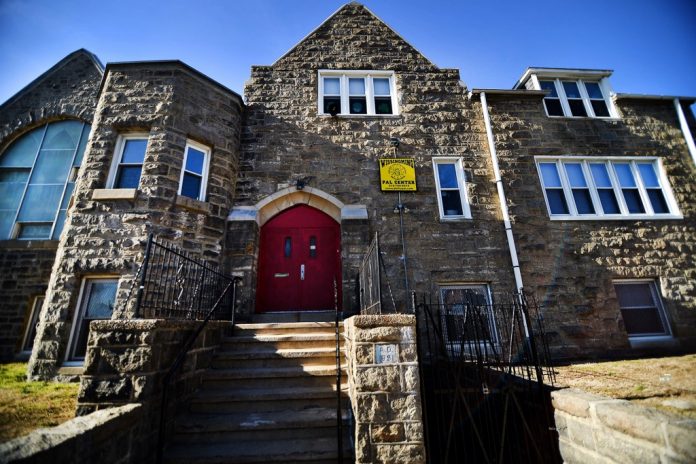Speaking out: In 2011, Paul Zenak began questioning what appeared to be shoddy asbestos cleanup work at the Wissinoming PAL center inside Wissinoming United Methodist Church at 4419 Comly St. MARIA POUCHNIKOVA / TIMES PHOTO
A Philadelphia police officer has won a civil lawsuit against the city in which he claimed that his supervisors retaliated against him after he complained about asbestos at a Police Athletic League center in Wissinoming.
On Friday, a Common Pleas Court jury awarded Officer Paul Zenak his old PAL job back and the restoration of months of expired sick time, as well as reimbursement for his medical and legal expenses. Judge John Milton Younge will determine the specific amount of the award after hearing additional testimony later this month.
A City Hall spokesman, Mark McDonald, said that city attorneys are reviewing the case and considering “a number of potential appellate issues,” but had no further comment.
Zenak’s lawyer, Aaron Freiwald, called the case a classic example of retaliation against a whistleblower. Zenak, a 44-year-old married father of two from the Northeast, was appointed as director of Wissinoming PAL in 2008 after about two decades of distinguished service with the police force.
“This is an officer who literally had not a blemish on his record in twenty years,” Freiwald said.
Things changed in early fall 2011 after Zenak began questioning his police supervisors about what appeared to be shoddy asbestos cleanup work at the Wissinoming PAL center inside Wissinoming United Methodist Church at 4419 Comly St. PAL rents space from the church.
According to Freiwald, PAL had hired a contractor to renovate the property. With work in progress, Zenak noticed what appeared to be mold on some overhead pipe insulation and asked the contractor about it. The contractor identified the ominous substance not as mold, but rather exposed asbestos. PAL paid the contractor to remove the hazardous material, Freiwald said.
Afterward, Zenak returned to the PAL center to find what appeared to be asbestos particles strewn across the floor. Fearing for his own safety and that of dozens of kids, Zenak pressed the issue. He discovered that the contractor was not licensed by the city to remove asbestos and that PAL was paying for widescale church renovations, although it didn’t own the property and only occupied a portion of it.
“PAL had budgeted three thousand dollars to perform repairs on the (PAL) room and it ballooned into a 22,000-dollar contract when all was said and done,” Freiwald said.
In addition, the PAL program paid the same contractor to remove asbestos from the Oxford Circle PAL, according to Freiwald. The PAL program is partially funded by city tax dollars and partially by corporate and private donations.
By spring 2012, Zenak’s personnel file was getting thicker with unflattering performance reports. His police supervisors wrote him up for failing to submit paperwork and because “he wasn’t running enough programs at the center,” said Freiwald, who claims the allegations were bogus.
“All the evidence they put forth to support their cause was lacking credibility,” Freiwald said.
In April 2012, Zenak and his complaints were a topic at a committee meeting of PAL’s civilian board of directors. During the audio-recorded session, Zenak’s supervisor accused the officer of fabricating the asbestos issue to cover his own poor job performance. When the board asked the supervisor why Zenak was still in charge of the PAL center, the supervisor replied “we’re working on that,” according to Freiwald.
Days after the board meeting, Zenak went on leave from the police department, citing health and emotional problems caused by his work situation. He used accrued sick time.
“He went on leave because he was afraid for his job,” Freiwald said.
Zenak filed the lawsuit in May 2012 and returned to work a few months ago on restricted duty after his wife was laid off from her job with the city’s public schools, according to the attorney.
The city has tested the Wissinoming PAL center for hazardous materials with negative results, but Freiwald contends that the testing was “inconclusive” and didn’t rule out the possibility of contamination.
The attorney has filed a class action lawsuit on behalf of the kids and their parents against the city seeking payment for medical screening and care related to asbestos exposure.
Police Commissioner Charles Ramsey was among the witnesses who testified at the Zenak trial. According to Freiwald, Ramsey said that the police department’s Internal Affairs Bureau is investigating the PAL supervisors involved in hiring the unlicensed asbestos contractor. No criminal charges have been filed.
Meanwhile, Freiwald said, since Zenak’s complaints, the department has instituted tighter regulations on how the PAL program spends money and the approval process for contractors.
“Now, (Zenak) is respected and PAL was improved,” Freiwald said. ••





